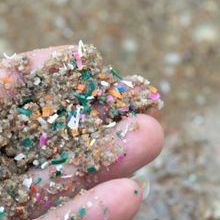Microplastics can help dangerous bacteria to survive on Scottish beaches
14 April 2023

Plastic pollution is a global issue – an estimated 2.3 million tonnes of it is thought to be floating in the world’s oceans – but we are only just realising the magnitude of its effects on human health.
It seems that microplastics are found everywhere; in freshly fallen snow, our blood and even a human placenta. They’re found throughout our water systems and, with no definitive way of removing them, their long-term impact on human health is still to be fully realised. However, it’s now clear that their presence could put the public at immediate risk. Recent research has found dangerous bacteria are able to survive the journey from sewage treatment plants to beaches on microplastic pollution, and has even found drug-resistant bacteria colonising microplastics on Scottish beaches.
It has been understood for some time that microplastics provide a protective environment (the so-called ‘plastisphere’) in which bacteria can survive in wastewater. For the first time, researchers at the University of Stirling, Scotland, have tracked how that could enable bacteria to survive the journey to the sea and make their way onto our beaches, where they can come into contact with humans.
Lead researcher, Rebecca Metcalf, supervised by Professor Richard Quilliam, subjected microplastics colonised by bacteria in wastewater to the different environments that they would likely pass through on their way to our beaches. Metcalf and her team found that, not only could bacteria such a E. coli survive the entire journey, but that viable bacteria also survived for 7 days on the sand.
“The plastic is providing a substrate for transferring pathogens from wastewater, and through river water, estuary and seawater, and finally up onto the beaches where they are much more likely to come into contact with humans” explains Metcalf. “Other surfaces where bacteria colonise, such as seaweed, wouldn’t necessarily go through that transfer route.”
Concerned by their findings, Metcalf wanted to see if this theoretical survival was happening on real beaches in Scotland. They collected polyethene and polystyrene plastic waste from 10 Scottish beaches and screened them for 7 target bacteria that cause disease in humans. Alarmingly, they found that these bacteria were present in virtually all of the samples, with some showing resistance to our most commonly used antibiotics.
This is worrying in light of sewage leaks and wastewater overflows onto our beaches: “We already have sewage ending up in the environment that contains harmful bacteria. But the plastics are transporting bacteria into places where they are more likely to come into contact with people” according to Metcalf.
“We hope that our research will add to the growing overarching evidence and support for increasing public awareness and ultimately pushes towards legislative changes for plastic discharge to the environment.”
Research still needs to take place to fully understand the potential risk that this may pose to those bathing at Britain’s beaches, as the likelihood for these pathogens to cause disease in humans is unknown. Researchers still urge the public to take care around plastic pollution but stress the importance of removing plastic from our beaches. “Don’t be afraid of taking part in a beach clean, it is vital that we remove the plastics from our beaches and dispose of them correctly, but I would encourage the public to wash their hands or use gloves.”
NOTES TO EDITOR
Rebecca Metcalf will present her data at this year's Microbiology Society Annual Conference at Birmingham International Convention Centre, which runs 17-20 April 2023. Her talk "Human bacterial pathogen survival and persistence on the surfaces of environmental microplastic pollution" will take place on Thursday 20 April 10:45am.
The Microbiology Society’s principal goal is to develop, expand and strengthen the networks available to its members so they can generate new knowledge about microbes and share it, driving us towards a world in which microbiology provides the maximum benefit to society. Find out more at microbiologysociety.org.
For more information please contact [email protected]
This work was supported by the UKRI Natural Environment Research Council (NERC) as part of the project, "Microbial hitchhikers of marine plastics: the survival, persistence & ecology of microbial communities in the ‘Plastisphere’" [grant number NE/S005196/1]
Image: iStock/pcess609
Image: iStock/pcess609.
